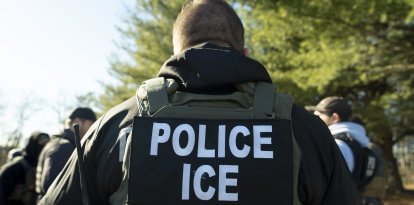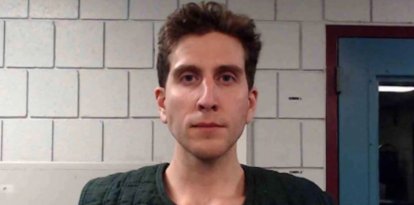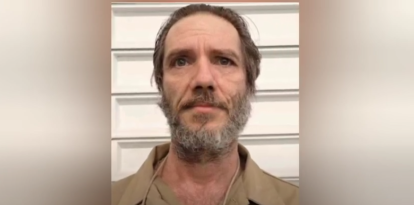The hidden statistic of the Biden-Harris border crisis: 2 million 'gotaways' 'dispersed into American communities'
"These are individuals who did not want to take advantage of current loose policies," Jessica M. Vaughan, director of policy studies for the Center for Immigration Studies, explained to VOZ. They didn't want to "be on the radar of U.S. law enforcement agencies."
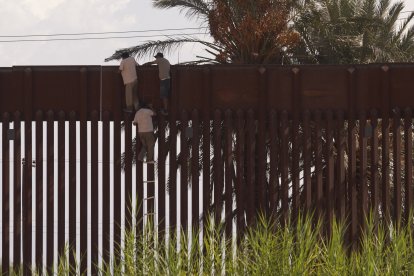
Immigrants cross the wall in El Centro, Calif.
A footprint. A hole in the border fences. The Border Patrol knows that when calculating monthly and annual data on illegal crossings along the southern, northern and coastal borders, there are a certain number of immigrants who slip through without ever being apprehended, and it must use things like a footprint or a hole to estimate how many there were.
They are known as "gotaways." According to new official data, the gotaways that made it into the country during the Biden-Harris administration outnumber the population of Wyoming. They outnumber the Dakotas, Delaware and New Hampshire, Rhode Island, Montana, Hawaii, West Virginia and six other states.
Those detection methods are combined with more accurate ones, such as in-person sightings, and modern ones, such as aerial patrol, CCTV cameras and motion sensors.
"If we don't know who is coming into our country, and we don't know what their intent is, that is a threat."
Former CBP head Raul Ortiz thanked Congress last year for the investment in these technologies, as "we have greater situation awareness that we've ever had." "Is it 100%? No sir… we continue to refine that number."
From the latest Border Patrol data, it appears that 1.8 million immigrants would have slipped through the country's borders illegally without being apprehended between February 2021 and September 2024. That figure was revealed following a Freedom of Information (FOIA) request by The Telegraph.
The total number of illegal immigrants that have entered the U.S. during the current administration's term would then escalate from 7.15 million to 8.9 million. That is 25% more than the number reported by the government (a provisional number, according to The Telegraph).
The figure that keeps the CBP awake
"Over 18K known gotaways in the first 16 days of FY24," wrote, accompanied with photos of footprints, Jason Owens, who replaced Ortiz as head of the border agency in June last year.
"These are individuals whose identities & purpose we do not know. That is why you need every Border Patrol agent to be in the field and on patrol."
Four months later, he posted that his agents had apprehended 890,000 and that the number of gotaways had risen to 120,000. What troubled him most, however, were the unknowns surrounding that number: "Who? What? Why?"
A month later, Owens replied to these words in a interview with CBS News: "That number [border apprehensions] is a large number, but what's keeping me up at night is the 140,000 known got-aways."
With more than 20 years of experience, in his most recent role as chief of the Del Rio division in Texas, the veteran agent said the situation had become "a national security threat."
"Border security is a big piece of national security... And if we don't know who is coming into our country, and we don't know what their intent is, that is a threat," he said before asserting that the cartels were taking advantage of "a vulnerability that's on our border right now."
2019-2024: A peak in illegal crossings
This week, data for the entire fiscal year 2024 was finally made available. The year saw the second most encounters in history.
Between the beginning of October 2023 and the end of September 2024, Customs and Border Protection recorded 2,901,142 apprehensions at all national borders, a figure only surpassed by the 3,201,144 in fiscal year 2023.
Although the ruling party celebrated a drop of more than 60% of gotaways, the Republican ranks were quick to recall that nearly 2 million immigrants escaped during the last four years, far exceeding the 500,000 of Donald Trump's presidency.
"The Biden-Harris administration has released millions of inadmissible aliens into the country without adequate vetting or screening, to say nothing of the roughly two million more who have entered as known gotaways," said members of the House Committee on Homeland Security.
They also recalled that, during Ortiz's congressional appearance, mentioned above, the border chief said the number of gotaways could be underreported by as much as 20%. "There is no way to know how many more potential national security threats, violent criminals, and hardened gang members are now at large in our country."
One of those 2 million gotaways, as recalled in a report, was Victor Antonio Martinez Hernandez, an illegal Salvadoran immigrant arrested for the murder of Rachel Morin in Maryland.
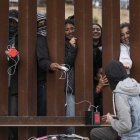
Society
“Huge hoax": Republicans accuse Biden-Harris administration of covering up border crisis
Rosana Rábago Sainz
We know we don't know
"These are individuals who did not want to take advantage of current loose policies," Jessica M. Vaughan, director of policy studies at the Center for Immigration Studies, explained to VOZ. They didn't want to "be on the radar of U.S. law enforcement agencies."
That, Vaughan contends, "suggests that they are likely to have a criminal record and/or have been deported before, or that they believe that if they were caught, they would be detained, for reasons we can only imagine and worry about. ... And now they are dispersed into American communities."
Is it possible to know, on average, how old they are? What country are they from? Where they are located? Drawing a profile of the average gotaway is difficult, if not impossible: "We know only what fleeting images might have been picked up on a camera, but not all of them would have been caught on camera." Other clues, such as sensors or fingerprints, shed no light.
'Gotaways' in the election
Though typically a jab by Republicans against the Biden-Harris administration, poor border management has become a bipartisan consensus (or at least the acknowledgment of such).
Since she was anointed candidate, Kamala Harris started talking about a "broken border system." Her own voters tell her so: 53% of the vice president's supporters responded in October that they wanted a tougher stance on the border, according to a survey by Redfield & Wilton Strategies for Newsweek.

Politics
Trump still ahead of Harris in Pennsylvania just days before presidential election
Joaquín Núñez
But the figures known to the general public, like all those often cited in the press, panels and campaign ads, ignore part of the problem: Gotaways are missing.
Despite this widespread ignorance, Vaughan believes that the numbers of escapees will impact the election as just another element of the border crisis, adding that "they help explain why they are hearing so much now about criminals, cartel operatives, theft groups, and gang members who have been able to settle here and launch criminal schemes in communities around the country."
"Voters," she asserts, "are upset about the chaos at the border and the cost of dealing with it in their communities." The ballot box will show precisely to what extent this is true.
RECOMMENDATION
